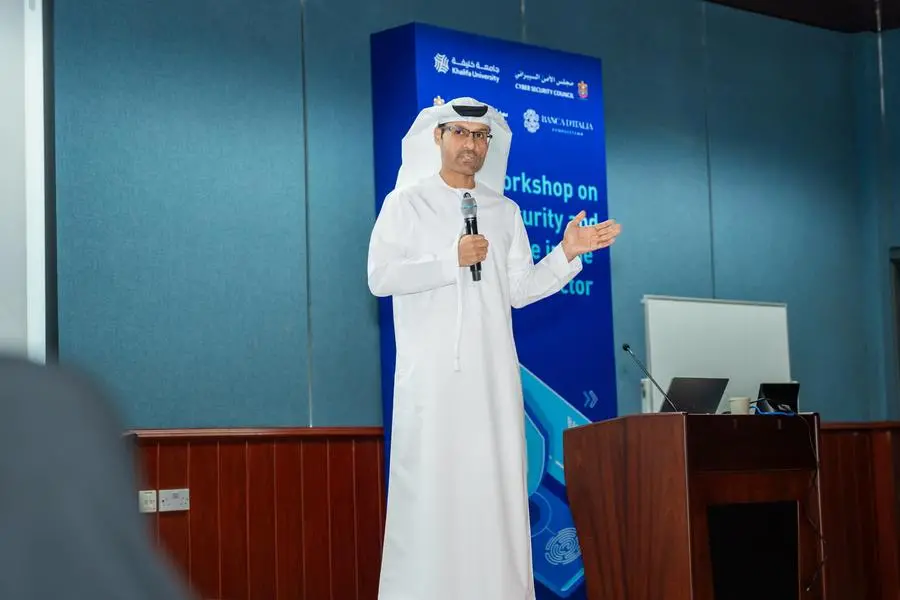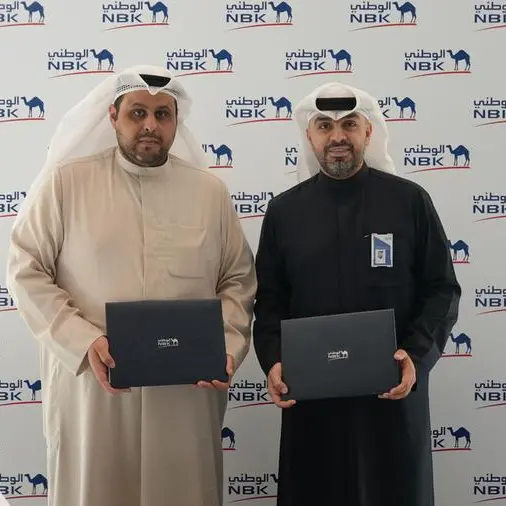PHOTO
Abu Dhabi-UAE: Khalifa University of Science and Technology and the UAE Cybersecurity Council today announced senior leaders from global banking and finance sector including central banks, financial institutions, and the academia gathered at Khalifa University for discussions on the critical importance of cybersecurity within the financial ecosystem. The event was co-organized with the Central Bank of the UAE (CBUAE) and the Bank of Italy (Banca d'Italia-BDI).
The event titled ‘Cybersecurity and Resilience in the Financial Sector’ at Khalifa University Main Campus featured distinguished speakers from CBUAE, BDI, the UAE Cyber Security Council, Khalifa University’s College for Computing and Mathematical Sciences, the University of Bologna and CERTfin. The public-private cooperative initiative aimed at increasing the cyber resilience of the Italian financial sector.
The event included keynote sessions, panel discussions, and networking opportunities, offering a platform for knowledge exchange and potential collaboration.
It started with welcome addresses from His Excellency Dr. Mohamed Al Kuwaiti, Head of UAE Cyber Security Council, H.E. Lorenzo Fanara, Ambassador of Italy to the UAE, H.E. Professor Ebrahim Al Hajri, President of Khalifa University (participation to be confirmed), and Claudio Impenna, Head of the Market and Payment System Oversight directorate at Banca d’Italia.
The keynote titled ‘Cyber threat in the financial sector – trends, challenges, and responses’, was delivered by Professor Ernesto Damiani, Dean of the College of Computing and Mathematical Sciences. It focused on bridging academic research with practical applications, offering a forward-looking perspective on technological advancements in financial cybersecurity with a focus on Artificial Intelligence and machine learning.
H.E. Dr. Mohamed Al Kuwaiti, Head of Cyber Security for the UAE Government, said: "The relentless evolution in cybersecurity and artificial intelligence places the financial sector on the frontlines against escalating cyberattacks and complex regulatory demands—particularly surgically targeted ransomware, AI-powered fraud networks, and emerging threats. Our challenge extends beyond asset protection to maintaining trust amid the fragile equilibrium between innovation and security. This demands AI-driven defense systems and radical cross-sector collaboration."
H.E. Professor Ebrahim Al Hajri, President, Khalifa University, said: “Khalifa University is privileged to host an event of this stature with central bankers and security experts to highlight the ever-expanding role of AI in the global banking and finance sector. This gathering also reflects the significance of cybersecurity and its integral part in blocking data breaches and protecting against financial losses, reputational damage, and regulatory penalties. We believe the discussions and knowledge sharing resulting from this event will positively impact policy-makers and facilitate the implementation of robust cyber security measures incorporating AI to safeguard financial assets.”
Thabet Bakheet Khamis, Director of Information Security at the Central Bank of the UAE, delivered a talk on ‘CBUAE experience in fostering Cybersecurity in the financial sector and lead a panel discussion on ‘Cybersecurity regulations and supervisory practices’.
Gino Giambelluca, Head of Payment Systems and Infrastructures oversight division at Banca d’Italia and BdI representative in the steering committee of CERTFin, delivered a talk on ‘Strengthening cyber resilience of the European financial ecosystem – policy, regulation and risk mitigation strategies’.
Professor Jorge Zubelli, Chair of the Department of Mathematics at Khalifa University, highlighted the University’s research for robust data analytics and AI in the financial sector.
Mario Trinchera, Chief Information Security Officer at ABI Lab. And manager of CERTfin cybersecurity operations, offered a presentation on public-private and cross-sector collaboration, covering threat intelligence and information sharing, cyber training, as well as the best practices and risk assessment tools.
Professor Michele Colajanni, University of Bologna, delivered a talk on ‘Innovation in cyber threat and response: How AI can improve the security of the financial sector’.
The Italian Central Bank’s Luca De Angelis led a session on ‘Enhancing Cyber Resilience through Threat-Led Penetration Testing’.
The closing panel on ‘Enhancing resilience and countering cyber frauds in the financial sector by leveraging the emerging technologies’, featured industrial presentations from the UAE and Italian companies. It was moderated by BdI’s Claudio Impenna. Industrial presenters will include representatives from Italy’s cybersecurity and cryptographic solutions provider Telsy, and the UAE companies of the CyberE71 program of the Cyber Security Council.
About Khalifa University of Science and Technology
Khalifa University of Science and Technology, the UAE’s top-ranked research-intensive institution, focuses on developing world leaders and critical thinkers in science, engineering and health science. The world-class university endeavors to be a catalyst to the growth of Abu Dhabi and the UAE’s rapidly developing knowledge economy as an education destination of choice and a global leader among widely acknowledged international universities.
For more information, please visit: http://www.ku.ac.ae/
About UAE Cyber Security Council
The UAE Cabinet established the Cyber Security Council in 2020 to support the UAE's commitment to achieving a safer digital transformation. It is headed by H.E. Dr. Mohammed Hamad Al-Kuwaiti and comprises a variety of federal and municipal authorities in the UAE. The Council is tasked with developing legislative and regulatory frameworks that address various issues, including cybersecurity and cybercrime, as well as securing present and upcoming technologies.
The Council's goal is to propose policies and legislation to improve cybersecurity in the country for all targeted sectors and bring them to the Cabinet for adoption and implementation in collaboration with the relevant authorities. It also aims to increase the readiness of all sectors to respond to emergency attacks efficiently and professionally, thereby enhancing the UAE's pioneering drive towards a highly developed digital future and creating a secure and solid cyber infrastructure.
The Council seeks to portray the forward-thinking vision of the UAE's solid leadership and proactive approach through highly specialized and active agencies capable of providing digital protection, securing an advanced infrastructure to ensure business continuity, and providing services regularly in all economic, educational, health, and social activities. The Council also works on spreading the cybersecurity culture through initiatives designed for various segments and protecting society from hacked online sites.




















